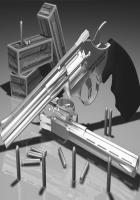“Ho, there!Master Joachim de Ladehors!Ho, there!Louis Dahuille!Ho, there!Lambert Hoctement!”
“May the devil stifle the procurator of the German nation!”
“And the chaplains of the Sainte-Chapelle, with their gray amices; cum tunicis grisis!”
“Seu de pellibus grisis fourratis!”
“Hello Masters of Arts!All the beautiful black copes!all the fine red copes!”
“They make a fine tail for the rector.”
“One would say that he was a Doge of Venice on his way to his bridal with the sea.”
“Say, Jehan!here are the canons of Sainte-Geneviève!”
“To the deuce with the whole set of canons!”
“Abbé Claude Choart!Doctor Claude Choart!Are you in search of Marie la Giffarde?”
“She is in the Rue de Glatigny.”
“She is making the bed of the king of the debauchees.”She is paying her four deniers, quatuor denarios.”
“Aut unum bombum.”
“Would you like to have her pay you in the face?”
“Comrades!Master Simon Sanguin, the Elector of Picardy, with his wife on the crupper!”
“Post equitem sedet atra cura.”
“Courage, Master Simon!”
“Good day, Mister Elector!”
“Good night, Madame Electress!”
“How happy they are to see all that!”sighed Joannes de Molendino, still perched in the foliage of his capital.
Meanwhile, the sworn bookseller of the university, Master Andry Musnier, was inclining his ear to the furrier of the king's robes, Master Gilles Lecornu.
“I tell you, sir, that the end of the world has come. No one has ever beheld such outbreaks among the students!It is the accursed inventions of this century that are ruining everything, —artilleries, bombards, and, above all, printing, that other German pest.No more manus, no more books!printing will kill bookselling.It is the end of the world that is drawing nigh.”
“I see that plainly, from the progress of velvet stuffs, ”said the fur-merchant.
At this moment, midday sounded.
“Ha!”exclaimed the entire crowd, in one voice.
The scholars held their peace. Then a great hurly-burly ensued; a vast movement of feet, hands, and heads; a general outbreak of coughs and handkerchiefs; each one arranged himself, assumed his post, raised himself up, and grouped himself.Then came a great silence; all necks remained outstretched, all mouths remained open, all glances were directed towards the marble table.Nothing made its appearance there.The bailiff's four sergeants were still there, stiff, motionless, as painted statues.All eyes turned to the estrade reserved for the Flemish envoys.The door remained closed, the platform empty.This crowd had been waiting since daybreak for three things:noonday, the embassy from Flanders, the mystery play.Noonday alone had arrived on time.
On this occasion, it was too much.
They waited one, two, three, five minutes, a quarter of an hour; nothing came. The dais remained empty, the theatre dumb.In the meantime, wrath had succeeded to impatience.Irritated words circulated in a low tone, still, it is true.“The mystery!the mystery!”they murmured, in hollow voices.Heads began to ferment.A tempest, which was only rumbling in the distance as yet, was floating on the surface of this crowd.It was Jehan du Moulin who struck the first spark from it.
“The mystery, and to the devil with the Flemings!”he exclaimed at the full force of his lungs, twining like a serpent around his pillar.
The crowd clapped their hands.
“The mystery!”it repeated, “and may all the devils take Flanders!”
“We must have the mystery instantly, ”resumed the student; “or else, my advice is that we should hang the bailiff of the courts, by way of a morality and a comedy.”
“Well said, ”cried the people, “and let us begin the hanging with his sergeants.”
A grand acclamation followed. The four poor fellows began to turn pale, and to exchange glances.The crowd hurled itself towards them, and they already beheld the frail wooden railing, which separated them from it, giving way and bending before the pressure of the throng.
It was a critical moment.
“To the sack, to the sack!”rose the cry on all sides.
At that moment, the tapestry of the dressing-room, which we have described above, was raised, and afforded passage to a personage, the mere sight of whom suddenly stopped the crowd, and changed its wrath into curiosity as by enchantment.
“Silence!silence!”
The personage, but little reassured, and trembling in every limb, advanced to the edge of the marble table with a vast amount of bows, which, in proportion as he drew nearer, more and more resembled genuflections.
In the meanwhile, tranquillity had gradually been restored. All that remained was that slight murmur which always rises above the silence of a crowd.
“Messieurs the bourgeois, ”said he, “and mesdemoiselles the bourgeoises, we shall have the honor of declaiming and representing, before his eminence, monsieur the cardinal, a very beautiful morality which has for its title, 'The Good Judgment of Madame the Virgin Mary.'I am to play Jupiter. His eminence is, at this moment, escorting the very honorable embassy of the Duke of Austria; which is detained, at present, listening to the harangue of monsieur the rector of the university, at the gate Baudets.As soon as his illustrious eminence, the cardinal, arrives, we will begin.”
It is certain, that nothing less than the intervention of Jupiter was required to save the four unfortunate sergeants of the bailiff of the courts. If we had the happiness of having invented this very veracious tale, and of being, in consecondTitle, responsible for it before our Lady Criticism, it is not against us that the classic precept, Nec deus intersit, could be invoked.Moreover, the costume of Seigneur Jupiter, was very handsome, and contributed not a little towards calming the crowd, by attracting all its attention.Jupiter was clad in a coat of mail, covered with black velvet, with gilt nails; and had it not been for the rouge, and the huge red beard, each of which covered one-half of his face, —had it not been for the roll of gilded cardboard, spangled, and all bristling with strips of tinsel, which he held in his hand, and in which the eyes of the initiated easily recognized thunderbolts, —had not his feet been flesh-colored, and banded with ribbons in Greek fashion, he might have borne comparison, so far as the severity of his mien was concerned, with a Breton archer from the guard of Monsieur de Berry.
Chapter2 Pierre Gringoire
Nevertheless, as be harangued, the satisfaction and admiration unanimously excited by his costume were dissipated by his words; and when he reached that untoward conclusion:“As soon as his illustrious eminence, the cardinal, arrives, we will begin, ”his voice was drowned in a thunder of hooting.
“Begin instantly!The mystery!the mystery immediately!”shrieked the people. And above all the voices, that of Johannes de Molendino was audible, piercing the uproar like the fife's derisive serenade:“Commence instantly!”yelped the scholar.
“Down with Jupiter and the Cardinal de Bourbon!”vociferated Robin Poussepain and the other clerks perched in the window.
“The morality this very instant!”repeated the crowd; “this very instant!the sack and the rope for the comedians, and the cardinal!”
Poor Jupiter, haggard, frightened, pale beneath his rouge, dropped his thunderbolt, took his cap in his hand; then he bowed and trembled and stammered:“His eminence—the ambassadors—Madame Marguerite of Flanders—.”He did not know what to say. In truth, he was afraid of being hung.
Hung by the populace for waiting, hung by the cardinal for not having waited, he saw between the two dilemmas only an abyss; that is to say, a gallows.
Luckily, some one came to rescue him from his embarrassment, and assume the responsibility.
An individual who was standing beyond the railing, in the free space around the marble table, and whom no one had yet caught sight of, since his long, thin body was completely sheltered from every visual ray by the diameter of the pillar against which he was leaning; this individual, we say, tall, gaunt, pallid, blond, still young, although already wrinkled about the brow and cheeks, with brilliant eyes and a smiling mouth, clad in garments of black serge, worn and shining with age, approached the marble table, and made a sign to the poor sufferer. But the other was so confused that he did not see him.The new comer advanced another step.
“Jupiter, ”said he, “my dear Jupiter!”
The other did not hear.
At last, the tall blond, driven out of patience, shrieked almost in his face, —
“Michel Giborne!”
“Who calls me?”said Jupiter, as though awakened with a start.
“I, ”replied the person clad in black.
“Ah!”said Jupiter.
“Begin at once, ”went on the other.“Satisfy the populace; I undertake to appease the bailiff, who will appease monsieur the cardinal.”
Jupiter breathed once more.
“Messeigneurs the bourgeois, ”he cried, at the top of his lungs to the crowd, which continued to hoot him, “we are going to begin at once.”
“Evoe Jupiter!Plaudite cives!All hail, Jupiter!Applaud, citizens!”shouted the scholars.
“N?el!N?el!good, good, ”shouted the people.
The hand clapping was deafening, and Jupiter had already withdrawn under his tapestry, while the hall still trembled with acclamations.
In the meanwhile, the personage who had so magically turned the tempest into dead calm, as our old and dear Corneille puts it, had modestly retreated to the half-shadow of his pillar, and would, no doubt, have remained invisible there, motionless, and mute as before, had he not been plucked by the sleeve by two young women, who, standing in the front row of the spectators, had noticed his colloquy with Michel Giborne-Jupiter.
“Master, ”said one of them, making him a sign to approach.“Hold your tongue, my dear Liénarde, ”said her neighbor, pretty, fresh, and very brave, in consecondTitle of being dressed up in her best attire.“He is not a clerk, he is a layman; you must not say master to him, but messire.”
“Messire, ”said Liénarde.
The stranger approached the railing.
“What would you have of me, damsels?”he asked, with alacrity.
“Oh!nothing, ”replied Liénarde, in great confusion; “it is my neighbor, Gisquette la Gencienne, who wishes to speak with you.”
“Not so, ”replied Gisquette, blushing; “it was Liénarde who called you master; I only told her to say messire.”
The two young girls dropped their eyes. The man, who asked nothing better than to enter into conversation, looked at them with a smile.
“So you have nothing to say to me, damsels?”
“Oh!nothing at all, ”replied Gisquette.
“Nothing, ”said Liénarde.
The tall, light-haired young man retreated a step; but the two curious maidens had no mind to let slip their prize.
“Messire, ”said Gisquette, with the impetuosity of an open sluice, or of a woman who has made up her mind, “do you know that soldier who is to play the part of Madame the Virgin in the mystery?”
“You mean the part of Jupiter?”replied the stranger.
“Hé!yes, ”said Liénarde, “isn't she stupid?So you know Jupiter?”
“Michel Giborne?”replied the unknown; “yes, madam.”
“He has a fine beard!”said Liénarde.
“Will what they are about to say here be fine?”inquired Gisquette, timidly.
“Very fine, mademoiselle, ”replied the unknown, without the slightest hesitation.
“What is it to be?”said Liénarde.
“'The Good Judgment of Madame the Virgin, '—a morality, if you please, damsel.”
“Ah!that makes a difference, ”responded Liénarde.
A brief silence ensued—broken by the stranger.
“It is a perfectly new morality, and one which has never yet been played.”
“Then it is not the same one, ”said Gisquette, “that was given two years ago, on the day of the entrance of monsieur the legate, and where three handsome maids played the parts—”
“Of sirens, ”said Liénarde.
“And all naked, ”added the young man.
Liénarde lowered her eyes modestly.Gisquette glanced at her and did the same.He continued, with a smile, —
“It was a very pleasant thing to see. To-day it is a morality made expressly for Madame the Demoiselle of Flanders.”
“Will they sing shepherd songs?”inquired Gisquette.
“Fie!”said the stranger, “in a morality?you must not confound styles. If it were a farce, well and good.”
“That is a pity, ”resumed Gisquette.“That day, at the Ponceau Fountain, there were wild men and women, who fought and assumed many aspects, as they sang little motets and bergerettes.”
“That which is suitable for a legate, ”returned the stranger, with a good deal of dryness, “is not suitable for a princess.”
“And beside them, ”resumed Liénarde, “played many brass instruments, making great melodies.”
“And for the refreshment of the passers-by, ”continued Gisquette, “the fountain spouted through three mouths, wine, milk, and hippocrass, of which every one drank who wished.”
“And a little below the Ponceau, at the Trinity, ”pursued Liénarde, “there was a passion performed, and without any speaking.”
“How well I remember that!”exclaimed Gisquette; “God on the cross, and the two thieves on the right and the left.”Here the young gossips, growing warm at the memory of the entrance of monsieur the legate, both began to talk at once.
“And, further on, at the Painters'Gate, there were other personages, very richly clad.”
“And at the fountain of Saint-Innocent, that huntsman, who was chasing a hind with great clamor of dogs and hunting-horns.”
“And, at the Paris slaughter-houses, stages, representing the fortress of Dieppe!”
“And when the legate passed, you remember, Gisquette?they made the assault, and the English all had their throats cut.”
“And against the gate of the Chatelet, there were very fine personages!”
“And on the Port au Change, which was all draped above!”
“And when the legate passed, they let fly on the bridge more than two hundred sorts of birds; wasn't it beautiful, Liénarde?”
“It will be better to-day, ”finally resumed their interlocutor, who seemed to listen to them with impatience.
“Do you promise us that this mystery will be fine?”said Gisquette.
“Without doubt, ”he replied; then he added, with a certain emphasis, —“I am the author of it, damsels.”
“Truly?”said the young girls, quite taken aback.
“Truly!”replied the poet, bridling a little; “that is, to say, there are two of us; Jehan Marchand, who has sawed the planks and erected the framework of the theatre and the woodwork; and I, who have made the piece. My name is Pierre Gringoire.”
The author of the“Cid”could not have said“Pierre Corneille”with more pride.
Our readers have been able to observe, that a certain amount of time must have already elapsed from the moment when Jupiter had retired beneath the tapestry to the instant when the author of the new morality had thus abruptly revealed himself to the innocent admiration of Gisquette and Liénarde.Remarkable fact:that whole crowd, so tumultuous but a few moments before, now waited amiably on the word of the comedian; which proves the eternal truth, still experienced every day in our theatres, that the best means of making the public wait patiently is to assure them that one is about to begin instantly.
However, scholar Johannes had not fallen asleep.
“Hello”he shouted suddenly, in the midst of the peaceable waiting which had followed the tumult.“Jupiter, Madame the Virgin, buffoons of the devil!are you jeering at us?The piece!the piece!commence or we will commence again!”
This was all that was needed.
The music of high and low instruments immediately became audible from the interior of the stage; the tapestry was raised; four personages, in motley attire and painted faces, emerged from it, climbed the steep ladder of the theatre, and, arrived upon the upper platform, arranged themselves in a line before the public, whom they saluted with profound reverences; then the symphony ceased.
The mystery was about to begin.
The four personages, after having reaped a rich reward of applause for their reverences, began, in the midst of profound silence, a prologue, which we gladly spare the reader.Moreover, as happens in our own day, the public was more occupied with the costumes that the actors wore than with the roles that they were enacting; and, in truth, they were right.All four were dressed in parti-colored robes of yellow and white, which were distinguished from each other only by the nature of the stuff; the first was of gold and silver brocade; the second, of silk; the third, of wool; the fourth, of linen.The first of these personages carried in his right hand a sword; the second, two golden keys; the third, a pair of scales; the fourth, a spade:and, in order to aid sluggish minds which would not have seen clearly through the transparency of these attributes, there was to be read, in large, black letters, on the hem of the robe of brocade, MY NAME IS NOBILITY; on the hem of the silken robe, MY NAME IS CLERGY; on the hem of the woolen robe, MY NAME IS MERCHANDISE; on the hem of the linen robe, MY NAME IS LABOR. The sex of the two male characters was briefly indicated to every judicious spectator, by their shorter robes, and by the cap which they wore on their heads; while the two female characters, less briefly clad, were covered with hoods.
Much ill-will would also have been required, not to comprehend, through the medium of the poetry of the prologue, that Labor was wedded to Merchandise, and Clergy to Nobility, and that the two happy couples possessed in common a magnificent golden dolphin, which they desired to adjudge to the fairest only. So they were roaming about the world seeking and searching for this beauty, and, after having successively rejected the Queen of Golconda, the Princess of Trebizonde, the daughter of the Grand Khan of Tartary, etc., Labor and Clergy, Nobility and Merchandise, had come to rest upon the marble table of the Palais de Justice, and to utter, in the presence of the honest audience, as many sentences and maxims as could then be dispensed at the Faculty of Arts, at examinations, sophisms, determinances, figures, and acts, where the masters took their degrees.
All this was, in fact, very fine.
Nevertheless, in that throng, upon which the four allegories vied with each other in pouring out floods of metaphors, there was no ear more attentive, no heart that palpitated more, not an eye was more haggard, no neck more outstretched, than the eye, the ear, the neck, and the heart of the author, of the poet, of that brave Pierre Gringoire, who had not been able to resist, a moment before, the joy of telling his name to two pretty girls. He had retreated a few paces from them, behind his pillar, and there he listened, looked, enjoyed.The amiable applause which had greeted the beginning of his prologue was still echoing in his bosom, and he was completely absorbed in that species of ecstatic contemplation with which an author beholds his ideas fall, one by one, from the mouth of the actor into the vast silence of the audience.Worthy Pierre Gringoire!
It pains us to say it, but this first ecstasy was speedily disturbed. Hardly had Gringoire raised this intoxicating cup of joy and triumph to his lips, when a drop of bitterness was mingled with it.
A tattered mendicant, who could no collect any coins, lost as he was in the midst of the crowd, and who had not probably found sufficient indemnity in the pockets of his neighbors, had hit upon the idea of perching himself upon some conspicuous point, in order to attract looks and alms. He had, accordingly, hoisted himself, during the first verses of the prologue, with the aid of the pillars of the reserve gallery, to the cornice which ran round the balustrade at its lower edge; and there he had seated himself, soliciting the attention and the pity of the multitude, with his rags and a hideous sore which covered his right arm.However, he uttered not a word.
The silence which he preserved allowed the prologue to proceed without hindrance, and no perceptible disorder would have ensued, if ill-luck had not willed that the scholar Joannes should catch sight, from the heights of his pillar, of the mendicant and his grimaces. A wild fit of laughter took possession of the young scamp, who, without caring that he was interrupting the spectacle, and disturbing the universal composure, shouted boldly, —
“Look!see that sickly creature asking alms!”
Any one who has thrown a stone into a frog pond, or fired a shot into a covey of birds, can form an idea of the effect produced by these incongruous words, in the midst of the general attention. It made Gringoire shudder as though it had been an electric shock.The prologue stopped short, and all heads turned tumultuously towards the beggar, who, far from being disconcerted by this, saw, in this incident, a good opportunity for reaping his harvest, and who began to whine in a doleful way, half closing his eyes the while, —”Charity, please!”
“Well—upon my soul, ”resumed Joannes, “it's Clopin Trouillefou!Hello, my friend, did your sore bother you on the leg, that you have transferred it to your arm?”So saying, with the dexterity of a monkey, he flung a bit of silver into the gray felt hat which the beggar held in his ailing arm.The mendicant received both the alms and the sarcasm without wincing, and continued, in lamentable tones, —
“Charity, please!”
This episode considerably distracted the attention of the audience; and a goodly number of spectators, among them Robin Poussepain, and all the clerks at their head, gayly applauded this eccentric duet, which the scholar, with his shrill voice, and the mendicant had just improvised in the middle of the prologue.
Gringoire was highly displeased. On recovering from his first stupefaction, he bestirred himself to shout, to the four personages on the stage, “Go on!What the devil!—Go on!”—without even deigning to cast a glance of disdain upon the two interrupters.
At that moment, he felt some one pluck at the hem of his surtout; he turned round, and not without ill-humor, and found considerable difficulty in smiling; but he was obliged to do so, nevertheless. It was the pretty arm of Gisquette la Gencienne, which, passed through the railing, was soliciting his attention in this manner.
“Monsieur, ”said the young girl, “are they going to continue?”
“Of course, ”replied Gringoire, a good deal shocked by the question.
“In that case, messire, ”she resumed, “would you have the courtesy to explain to me—”
“What they are about to say?”interrupted Gringoire.“Well, listen.”
“No, ”said Gisquette, “but what they have said so far.”
Gringoire started, like a man whose wound has been probed to the quick.
“A plague on the stupid and dull-witted little girl!”he muttered, between his teeth.
From that moment forth, Gisquette was nothing to him.















